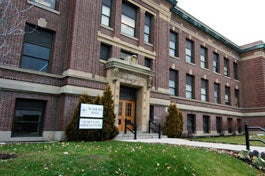Most Rensselaer students are not from the immediate Capital Region area, meaning that when they first matriculate and/or return from a semester break, they are leaving many of the usual support systems, such as family and friends, that they utilize.
Although many students quickly establish new and equally effective support systems, a number of students find the various pressures very stressful, sometimes to the point where it interferes with their academic success, emotional well-being, or their ability to take advantage of the educational opportunities available to them at Rensselaer. This lack of support may intensify during common semester "crisis periods" such as mid-term, final exam, or pre-holiday periods. As faculty and staff at Rensselaer, you may encounter these distressed students looking to you for support.
We understand that there are many factors that are relevant to your willingness to respond, including your particular beliefs about the limits of a faculty or staff member's responsibility for helping students, or your personal style or philosophy. Other factors such as class size and/or format, the student's openness to assistance, and a student's comfort in seeking out contact, may have a substantial effect on the type of interactions you can have with a student. However, the likelihood is, that at some point in your tenure at Rensselaer, you will come into contact with a student in distress and in need of psychological assistance.
The Student Health Center is confident that faculty and staff can identify these students and offer valuable assistance, and has prepared a variety of information to assist faculty and staff in identifying, facilitating, and referring students in distress. We hope that the following information and recommendations will assist you in helping students in making optimum use of their educational experience at Rensselaer.
The Counseling Center staff is available to consult with faculty and staff to address their questions regarding personal mental health matters, campus resources, and community referrals. Just call our office at (518) 276-6479 during normal business hours, and your call will be forwarded to a psychologist on staff.
In addition, Rensselaer faculty and/or staff members who may have concerns about a student can contact our offices for assistance. However, please keep in mind that, due to confidentiality laws, the Health Center may not be able to provide specific information about that student if s/he is utilizing our services.
Faculty and staff have several choices for seeking help if they are concerned about one of their students.
- Contact the student’s class dean and express your concerns, as these administrators offer an opportunity to be seen by those who interact with him/her the most. Since these interactions are often not bound to confidentiality restrictions in comparison to those of the Counseling Center staff, they may be able to offer more information about your student’s situation than the Student Health Center legally can.
- For students whose concerns require counseling or psychological assessment, refer them to the Counseling Center to meet with a staff member. If you would like to do this, please have the student contact our offices at (518) 276-6479 to make an appointment. If the matter is urgent and your student must be seen immediately, he or she can come to the Student Health Center's office in 4100 Academy Hall.
Faculty and staff who need consultation on how to refer students to the Counseling Center are welcome to call the Student Health Center for suggestions and ideas.
Faculty and staff who encounter an urgent matter or emergency regarding a student during normal business hours (Monday through Friday, 8:00am-4:30pm) should call the Student Health Center immediately at (518) 276-6479.
If a student has an urgent matter outside normal business hours, please call the Public Safety Emergency line at (518) 276-6611.
Anyone suspecting that a student in their office is actively suicidal should attempt to stay with the student until help arrives, or encourage them to walk with you to the Student Health Center's offices.
